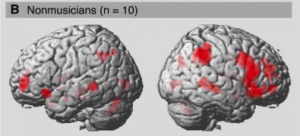 Improvisational jazz is a uniquely american art-form, which I, and many others hold in high regard. It brings a lot of harmless joy to people all over the world, and performers of this art are well respected. But is it possible that the talent to perform in this way is actually the result of a disease? It might be. Let me explain.
Improvisational jazz is a uniquely american art-form, which I, and many others hold in high regard. It brings a lot of harmless joy to people all over the world, and performers of this art are well respected. But is it possible that the talent to perform in this way is actually the result of a disease? It might be. Let me explain.
A few years back Dr Charles Limb decided to monitor the brains of jazz musicians and compare scans of their brains taken while they were playing written music, against those taken while they were playing improvised music. The results:
The scientists found that a region of the brain known as the dorsolateral prefrontal cortex, a broad portion of the front of the brain that extends to the sides, showed a slowdown in activity during improvisation. This area has been linked to planned actions and self-censoring, such as carefully deciding what words you might say at a job interview. Shutting down this area could lead to lowered inhibitions, Limb suggests.
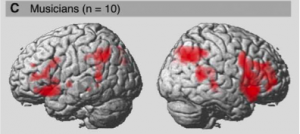 Uh oh – we have a brain scan that shows decreased activity in a very technically labelled region of the brain – which means that playing improvised jazz is a disease! You read it for yourself, inhibitions are lowered – which means that jazz musicians can’t control themselves from improvising. This is very serious stuff, we need to get some medical treatment for these poor souls.
Uh oh – we have a brain scan that shows decreased activity in a very technically labelled region of the brain – which means that playing improvised jazz is a disease! You read it for yourself, inhibitions are lowered – which means that jazz musicians can’t control themselves from improvising. This is very serious stuff, we need to get some medical treatment for these poor souls.
Sound a little stupid? That’s because it is. It’s utterly ridiculous to measure brain activity during any particular behavior a person may engage in, and then jump to the conclusion that the behavior in question is involuntary and the result of a disease. There is a massive missing step needed to take you from a mere measurement of brain activity to the conclusion that the behavior is a disease. Please don’t misunderstand me though, that’s not what these researchers are suggesting about improvised jazz – yet if you follow the logic of arguments about the disease of addiction, then you would naturally come to this conclusion. After all, the dorsolateral prefrontal cortex, and the lowering of inhibitions is also mentioned in studies of addiction, and then held up as proof that addiction is a disease:
Frontal abnormalities in drug-addicted subjects also are manifested in the dorsolateral prefrontal cortex, which is expected to affect processes involved in executive control (Royall et al., 2002).
Disruption of prefrontal activity in drug-addicted subjects could lead to impairments in self-monitoring and behavior control playing an important role in the cognitive changes that perpetuate drug self-administration (Kaufman et al., 2003).
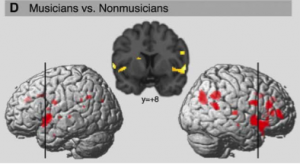 Admittedly, the arguments for addiction as a disease don’t rest on a single part of the brain – they regularly feature discussions of increased activity in some parts of the brain, and decreased activity in other parts of the brain. Also, some studies measure activity at the point of use or during exposure to drug cues, and others examine long term changes in the brain. The relationship between music and the brain is an area of research where a lot of work is being done. There are all kinds of studies analogous to those done on addiction – they’ve measured musicians brains versus non-musicians brains, they’ve tested whether conductors are better at tuning out non-auditory stimuli than the average person, and they’ve looked into countless other issues involving music and the brain. My point is that the same issues are involved, the same brain regions are involved, and the same phenomenon of both long term changes and immediate differences in functioning are all seen in studies of music just as they are in addiction.
Admittedly, the arguments for addiction as a disease don’t rest on a single part of the brain – they regularly feature discussions of increased activity in some parts of the brain, and decreased activity in other parts of the brain. Also, some studies measure activity at the point of use or during exposure to drug cues, and others examine long term changes in the brain. The relationship between music and the brain is an area of research where a lot of work is being done. There are all kinds of studies analogous to those done on addiction – they’ve measured musicians brains versus non-musicians brains, they’ve tested whether conductors are better at tuning out non-auditory stimuli than the average person, and they’ve looked into countless other issues involving music and the brain. My point is that the same issues are involved, the same brain regions are involved, and the same phenomenon of both long term changes and immediate differences in functioning are all seen in studies of music just as they are in addiction.
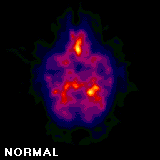 Similar studies have been done measuring what goes on in the brain during sexual arousal, during exposure to food, and during meditation among other activities. Currently, Dr Limb is also studying what goes on in the brain during freestyle rapping (another improvised art-form), and it is suspected that some of the same phenomena involved in the jazz study will be involved. Certainly, people have been known to be addicted to food and sex – but these aren’t things we pretend they must completely abstain from or risk losing all control over. Music and meditation are not known as being major points of addiction, and we’d be hard pressed to characterize involvement in such activities as being caused by a disease. Yet with all of these activities, we can now point to pretty pictures of brain scans, and isolate areas which are more or less active than others – but the fact that we can do so shouldn’t lead us to believe that these are involuntary behaviors or diseases. The evidence is what it is, a simple measurement of what’s going on at a neurological level. A sound argument needs to exist, a clear chain of cause and effect needs to exist for us to reach these conclusions – evidence of actual malfunction needs to exist. As far as I’m concerned, we’re just seeing normal functioning of the brain with this research – we’re seeing what normally goes on in the brain of a meditator, a musician, or a drug user. While this is important and interesting work, it’s important to see it for what it is, without jumping to unwarranted conclusions. It seems to me that in this discussion, the main difference between being an expert musician and an expert drug user is only a matter of viewing one of the behaviors as positive and the other as negative, but if we call one a disease, we should call the other a disease too – and pretty soon, as we get more and more research about the workings of the brain during other activities, then we’ll soon be labeling every behavior as a disease. At that point, “disease” loses all of its meaning, and our culture has reached complete and total madness as well as impotence at dealing with the fundamental challenges of life.
Similar studies have been done measuring what goes on in the brain during sexual arousal, during exposure to food, and during meditation among other activities. Currently, Dr Limb is also studying what goes on in the brain during freestyle rapping (another improvised art-form), and it is suspected that some of the same phenomena involved in the jazz study will be involved. Certainly, people have been known to be addicted to food and sex – but these aren’t things we pretend they must completely abstain from or risk losing all control over. Music and meditation are not known as being major points of addiction, and we’d be hard pressed to characterize involvement in such activities as being caused by a disease. Yet with all of these activities, we can now point to pretty pictures of brain scans, and isolate areas which are more or less active than others – but the fact that we can do so shouldn’t lead us to believe that these are involuntary behaviors or diseases. The evidence is what it is, a simple measurement of what’s going on at a neurological level. A sound argument needs to exist, a clear chain of cause and effect needs to exist for us to reach these conclusions – evidence of actual malfunction needs to exist. As far as I’m concerned, we’re just seeing normal functioning of the brain with this research – we’re seeing what normally goes on in the brain of a meditator, a musician, or a drug user. While this is important and interesting work, it’s important to see it for what it is, without jumping to unwarranted conclusions. It seems to me that in this discussion, the main difference between being an expert musician and an expert drug user is only a matter of viewing one of the behaviors as positive and the other as negative, but if we call one a disease, we should call the other a disease too – and pretty soon, as we get more and more research about the workings of the brain during other activities, then we’ll soon be labeling every behavior as a disease. At that point, “disease” loses all of its meaning, and our culture has reached complete and total madness as well as impotence at dealing with the fundamental challenges of life.
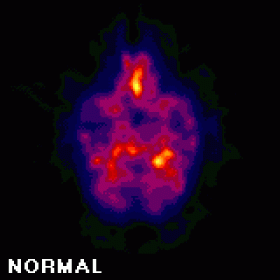
lol freestyle rap as a disease.